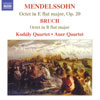Bruch; Mendelssohn Octets
In his eighties, Bruch still had plenty of fire – so why the neglect?
View record and artist detailsRecord and Artist Details
Composer or Director: Max Bruch, Felix Mendelssohn
Genre:
Chamber
Label: Naxos
Magazine Review Date: 8/2006
Media Format: CD or Download
Media Runtime: 56
Mastering:
Stereo
DDD
Catalogue Number: 8557270

Tracks:
| Composition | Artist Credit |
|---|---|
| Octet for strings |
Felix Mendelssohn, Composer
Auer Quartet Felix Mendelssohn, Composer Kodály Quartet |
| Octet |
Max Bruch, Composer
Auer Quartet Kodály Quartet Max Bruch, Composer Zsolt Fejérvári, Double bass |
Author: DuncanDruce
Mendelssohn and Bruch are frequent CD companions – but not with these works! It’s astonishing that such a substantial, characteristic piece as Bruch’s Octet should have been so neglected. The clue lies, perhaps, in when it was composed, a few months before Bruch’s death. There’s no feeling that the octogenarian had run out of steam – fine melodies and inventive developments abound – though it’s a work that could, one feels, have just as well been written in 1870 as in 1920. With a focused recording, Bruch’s rich, full sonorities are splendidly realised by players who achieve impressive stylistic and tonal unanimity. The first movement, with its memorable opening theme, sounds especially fine; there’s a sense of continuity between the lyrical and the energetically passionate music that gives it a powerful impetus.
If the Bruch represents the last glow of Romanticism, the Mendelssohn is a product of its bright heyday. This account brings the same virtues that make the Bruch so successful – superb balance and blend, expressive tone, rhythmic energy – yet without quite producing a performance to match the intensity of the youthful composer’s imagination. I hesitate to describe such accomplished, sensitive playing as tame but it certainly can’t compete with the sweep and conviction of the 2004 Ensemble Explorations recording. The broad perorations in the codas of the first and last movements don’t generate the same excitement, and though the Scherzo sounds brilliant, its fast tempo doesn’t allow for any further increase on reaching the Presto finale. An enthusiastic recommendation for the Bruch, then, with some reservations about the Mendelssohn.
If the Bruch represents the last glow of Romanticism, the Mendelssohn is a product of its bright heyday. This account brings the same virtues that make the Bruch so successful – superb balance and blend, expressive tone, rhythmic energy – yet without quite producing a performance to match the intensity of the youthful composer’s imagination. I hesitate to describe such accomplished, sensitive playing as tame but it certainly can’t compete with the sweep and conviction of the 2004 Ensemble Explorations recording. The broad perorations in the codas of the first and last movements don’t generate the same excitement, and though the Scherzo sounds brilliant, its fast tempo doesn’t allow for any further increase on reaching the Presto finale. An enthusiastic recommendation for the Bruch, then, with some reservations about the Mendelssohn.
Discover the world's largest classical music catalogue with Presto Music.

Gramophone Digital Club
- Digital Edition
- Digital Archive
- Reviews Database
- Full website access
From £8.75 / month
Subscribe
Gramophone Full Club
- Print Edition
- Digital Edition
- Digital Archive
- Reviews Database
- Full website access
From £11.00 / month
Subscribe
If you are a library, university or other organisation that would be interested in an institutional subscription to Gramophone please click here for further information.




